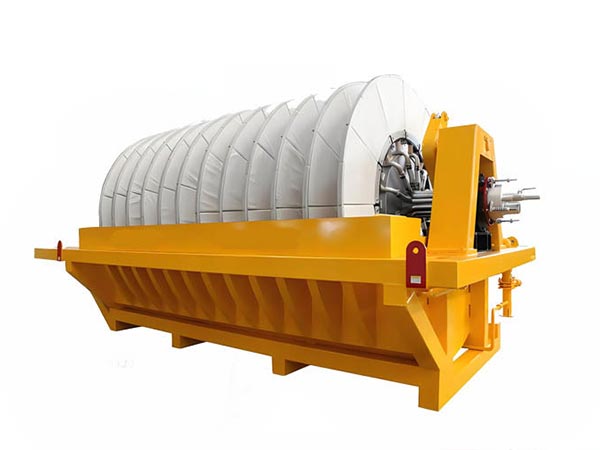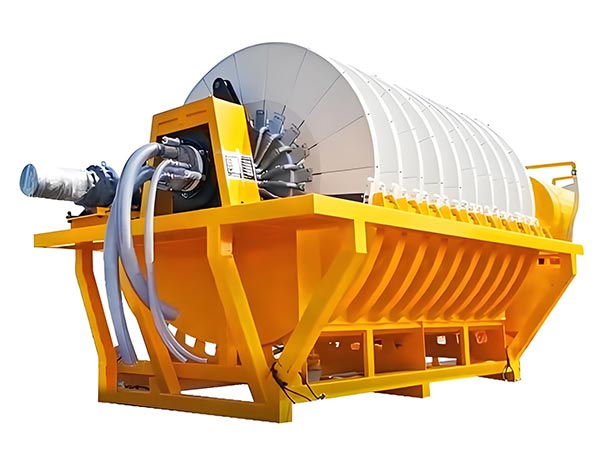Introduction to Ceramic Vacuum Disc Filters
In the industrial filtration sector, ceramic vacuum disc filters play a vital role across numerous industries due to their unique structural design and exceptional filtration performance, resolving many filtration challenges for enterprises.
Most ceramic vacuum disc filters feature a circular disc design. The filter disc surface is densely covered with minute pores. These pores are not only numerous but also exceptionally uniform in size. Furthermore, ceramic inherently possesses wear-resistant and corrosion-resistant properties, ensuring stable operation even under conditions of high acid/alkali concentration and high impurity content.
Compared to conventional filtration equipment on the market, ceramic vacuum disc filters not only achieve higher precision—capturing finer solid particles—but also operate at faster filtration speeds, significantly boosting overall production efficiency. Their service life exceeds that of standard equipment, and they require less frequent replacement of core components. Due to these advantages, this equipment is now a preferred choice in many industrial settings where efficient solid-liquid separation is required.
Working Principle of Ceramic Vacuum Disc Filters
Ceramic vacuum disc filters are solid-liquid separation devices that ensure continuous and efficient filtration operations. The process primarily involves three key steps
Filtration Stage
The suspension containing solid particles is first fed into the filter tank. Upon activating the vacuum system, the ceramic filter discs submerge into the suspension. Utilizing vacuum suction, the liquid in the suspension permeates through the fine pores on the disc surface into the internal channels, while solid particles are retained on the disc surface to form a filter cake. This filtration stage concludes once the filter cake reaches a predetermined thickness.
Washing Stage
The freshly formed filter cake contains trapped soluble impurities. If not promptly removed, these may affect subsequent recovery or processing. Wash water is evenly sprayed onto the cake surface. Utilizing vacuum suction, the water permeates the cake, carrying impurities outwards. These impurities are then discharged through the filter disc channels. Typically, two to three wash cycles are performed to reduce impurity content in the filter cake, meeting subsequent production requirements for cake purity.
Cake Discharge Stage
After thorough cleaning, the vacuum system is first shut off, followed by activation of the compressed air system. Compressed air blows from the inner to outer surface of the ceramic filter disc, dislodging adhered cake material. The dislodged cake falls onto a conveyor belt or collection device beneath the equipment for immediate removal and processing. Some cake may be recycled, while others require further treatment to meet standards. Once all filter cake is discharged, the ceramic filter discs return to their initial state, ready for the next filtration cycle.
What is the function of a ceramic vacuum disc filter?
As a commonly used high-efficiency solid-liquid separation device in industry, the ceramic vacuum disc filter is far from being merely decorative. It resolves numerous critical issues in production, primarily serving three key functions:
First, it helps enterprises recycle valuable resources. Many factories generate wastewater containing substantial valuable solid particles, such as concentrate powder from mines or catalysts from chemical plants. Ceramic vacuum disc filters separate these solids from wastewater while producing filter cakes with exceptionally low moisture content. These filter cakes can be reused in production, enhancing resource utilization and reducing costs for businesses.
Second, it purifies wastewater to minimize environmental impact. Discharging untreated industrial wastewater directly pollutes rivers and soil with contaminants, violating environmental regulations and damaging ecosystems. Ceramic vacuum disc filters remove solid particles, suspended solids, and harmful substances from wastewater. The treated water either meets national discharge standards or can be reused in production. This approach prevents environmental pollution from discharged water while reducing reliance on fresh water supplies, enabling water resource recycling—perfectly aligning with current environmental and sustainability requirements.
Third, it enhances production efficiency while ensuring product quality. In many industrial processes, filtration is a critical step. The effectiveness of filtration directly impacts the smooth progression of subsequent production stages and the final product's quality compliance. Ceramic vacuum disc filters operate at high speeds with exceptional precision, rapidly separating solids from liquids. This provides stable raw materials or intermediate products for subsequent processes, naturally boosting overall production efficiency. Furthermore, by thoroughly removing impurities from raw materials or intermediates, these filters ensure consistent product quality, enhancing the competitiveness of the enterprise's offerings in the marketplace.


Why Choose Ceramic Vacuum Disc Filters?
Among numerous filtration devices, ceramic vacuum disc filters stand out as the preferred choice for enterprises. This is because they address customers' practical challenges and deliver tangible benefits.
In terms of filtration performance, it achieves high precision. The controllable pore size of ceramic filter discs effectively traps even fine particles. The filtered water is clear, enabling reuse or compliant discharge, thereby reducing wastewater treatment costs. The low moisture content of the filter cake facilitates transportation and storage while enhancing subsequent drying and recovery efficiency.
Regarding operational costs, ceramic vacuum disc filters offer significant advantages. Compared to traditional filter cloths or membranes, they substantially reduce replacement expenses. Vacuum suction consumes minimal energy, resulting in substantially lower electricity costs compared to high-energy-consumption equipment, delivering substantial savings for enterprises.
Regarding environmental performance, the high filtration precision effectively removes solid particles and harmful substances from wastewater, preventing secondary environmental damage. Furthermore, end-of-life ceramic filter discs can be recycled, enabling resource circularity.
Maintenance of Ceramic Vacuum Disc Filters
To ensure the long-term operation of ceramic vacuum disc filters, regular maintenance is essential. Following these steps can effectively reduce the likelihood of equipment malfunctions:
1. Ceramic filter discs require regular cleaning. Over time, fine pores on the discs can become clogged with small particles, slowing filtration. Cleaning should be performed either with high-pressure water or chemical agents to thoroughly remove impurities from the pores and restore filtration efficiency. The specific cleaning frequency depends on equipment usage, but cleaning at least once a week is generally advisable.
2. Regularly inspect the vacuum chamber's compressed air system. As the core filtration component, the vacuum system requires periodic checks of the vacuum pump's operational status and pipeline seals to ensure vacuum levels meet equipment requirements. Immediately shut down and repair if abnormal noises or reduced vacuum levels are detected.
3. The transmission and control systems must also be monitored. For transmission components like motors, reducers, and chains, check lubrication levels and inspect for looseness or abnormalities. The control system—including the PLC control cabinet, sensors, and actuators—requires verification of functional integrity, sensor data accuracy, and actuator responsiveness. Should control system issues arise, promptly investigate the cause to prevent disruption to normal equipment operation.
Summary
Ceramic vacuum disc filters utilize ceramic as the filtration medium, relying on vacuum suction to achieve solid-liquid separation through a continuous “filtration-washing-cake discharge” cycle. They offer high filtration precision with reusable effluent, while the ceramic medium ensures durability, low energy consumption, minimal labor requirements, and strong environmental compatibility. Suitable for mining, chemical, food and pharmaceutical, environmental protection, and other industries, routine maintenance involves only periodic disc washing and inspection of the vacuum and drive systems.
Yinuo Machinery has specialized in vacuum filtration technology for years, rigorously controlling standards from media selection to component assembly to ensure efficient and durable equipment. For inquiries regarding equipment selection, specifications, or quality, please contact us. We provide expert consultation and customized solutions.







